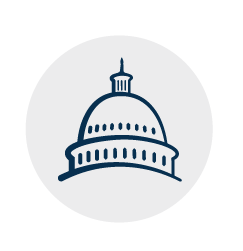House Passes Bipartisan Omnibus Spending Package
On March 9, 2022, the House of Representatives passed a massive bipartisan appropriations package to fund the federal government through the fiscal year ending on September 30, 2022. The 2,700-plus page bill was voted on in two parts. The first piece, approved by a 260-171 vote, funds the majority of the government’s programs and includes $53.7 billion for HUD, a $4 billion increase above the Fiscal Year (FY) 2021 level. The second piece, approved by a vote of 361-69, funds defense and security-related programs. The separately passed bills will be combined into a single package before the legislation is sent to the Senate for consideration. Because the Senate may not have time to process the legislation before the current continuing resolution runs out on March 11th, the House also passed a stop gap measure that will fund the government through March 15th.
While past omnibus spending bills have included a tax title, this legislation does not. We had hoped our LIHTC provisions might be included in this bill, but we will continue to work with House and Senate leadership and our Hill champions to find an appropriate vehicle to carry them. The bill also does not include the industry-supported language to amend the Coronavirus State and Local Fiscal Recovery Fund (SLFRF) program to facilitate its use with the affordable housing credit. There was initial bipartisan support for this language but Republican opposition to the American Rescue Plan Act, within which the SLFRFs were authorized, led them to withdraw their support. We appreciate NCSHA’s leadership on this issue and will continue to work with our industry partners to urge Congress to allow SLFRFs to be used for long-term loans to housing credit-financed developments.
Funding in the omnibus spending bill for affordable housing includes the following:
• $27.4 billion for Tenant-based Rental Assistance ($1.6 billion above FY 2021).
• $13.9 billion for Project-based Rental Assistance ($475 million above FY 2021).
• $1.5 billion for the HOME Investment Partnerships program ($150 million above FY 2021).
• $3.3 billion for Community Development Block Grants ($150 million below FY 2021).
• $8.45 billion for public housing ($645.5 million above FY 2021).
• $350 million for the Choice Neighborhoods Initiative ($150 million above FY 2021).
• $1.49 billion for rental assistance and rental vouchers for affordable rental housing for low-income families and the elderly in rural communities to renew all existing rental assistance contracts.
• $1 billion for housing for the elderly ($145 million above FY 2021).
• $3.2 billion for homeless assistance grants ($213 million above FY 2021).
• $1 billion for Native American programs ($177 million above FY 2021).
• $450 million for housing opportunities for persons with AIDS ($20 million above FY 2021).
• $352 million for housing for persons with disabilities ($125 million above FY 2021).
• $159 million for self-sufficiency programs ($4 million above FY 2021).
• $415 million for the Office of Lead Hazard Control and Healthy Homes. ($55 million above FY 2021).
• $85 million for fair housing and equal opportunity ($12 million above FY 2021).
• $166 million for NeighborWorks.
A detailed summary of the omnibus appropriations package can be found here. A short summary of the HUD provisions can be found here.
We also continue to work with advocates in the industry and on Capitol Hill on future consideration of a reconciliation package (the old Build Back Better Act) and a tax extenders package, both of which could carry LIHTC provisions. We will keep you apprised as these discussions progress.
Please let us know if you have any questions or comments.

